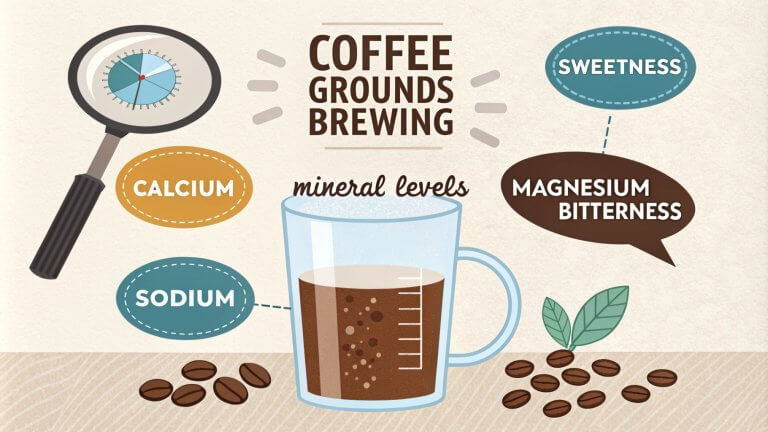
Your morning cup of coffee provides an instant energy boost, but have you ever wondered exactly how long that caffeine stays in your system? This comprehensive guide empowers you with the knowledge of the science behind caffeine metabolism, factors that affect its duration, and practical tips for managing your caffeine intake to achieve optimal energy and health.
Understanding How Caffeine Works in Your Body
Caffeine begins working within minutes of consumption, blocking adenosine receptors in your brain that commonly cause drowsiness and relaxation. This interference with adenosine is what creates caffeine’s stimulating effects. The stimulant reaches peak levels in your bloodstream within 30-60 minutes after consumption, providing you with the familiar feeling of alertness and energy.
Unlike other substances, caffeine is rapidly absorbed, with 99% entering your bloodstream within 45 minutes of ingestion. Once absorbed, caffeine travels throughout the body, affecting various systems. It stimulates the central nervous system, increasing alertness and reducing the perception of fatigue. It also affects the heart, increasing heart rate and blood pressure. In the muscles, caffeine can enhance endurance and reduce the perception of effort during exercise. Additionally, it can increase urine production in the kidneys.
The Caffeine Absorption Timeline

From Sip to System: How Quickly Caffeine Works
When you consume caffeine, it follows a predictable timeline in your body:
- 15-45 minutes: Initial effects become noticeable
- 30-60 minutes: Blood caffeine levels peak
- 1-2 hours: Maximum alertness and energy effects
- 3-5 hours: Effects begin to decrease gradually
- 5-6 hours: Half-life point (50% of caffeine remains)
- 10-12 hours: Complete elimination for most adults
The half-life of caffeine, which is the time it takes for your body to eliminate half of the caffeine, averages 5-6 hours in healthy adults. This means that if you consume 200 mg of caffeine, approximately 5-6 hours later, you’ll still have about 100 mg in your system. However, this varies significantly between individuals. Caffeine’s effects diminish as your body metabolises it, primarily through liver enzymes that break it down into metabolites, which are eventually excreted through urine.
How Caffeine Affects Your Brain and Body
Caffeine’s stimulating effects result from its interaction with adenosine, a neurotransmitter that accumulates throughout the day and promotes sleep. By blocking adenosine receptors, caffeine prevents the drowsiness signal and simultaneously increases the activity of other stimulating neurotransmitters, such as dopamine and norepinephrine.
Factors That Influence How Long Caffeine Lasts
Multiple factors determine how long caffeine remains active in your system. Understanding these variables can help explain why caffeine might affect you differently than others or why its effects change throughout your life.
Age and Metabolism
Age significantly impacts how quickly your body processes caffeine. As you grow older, your metabolism naturally slows, and your body takes longer to clear caffeine:
- Children and adolescents metabolise caffeine much faster, with a half-life of about 3-4.5 hours
- Young and middle-aged adults typically have a caffeine half-life of 5-5.5 hours
- Older adults (65+) process caffeine about 33% more slowly, with a half-life extended to 7 hours or more

Factors That Influence How Long Caffeine Lasts
This age-related difference explains why older adults may experience more pronounced and prolonged effects from the same amount of caffeine they consumed when younger.
Genetics and Individual Variations
Genetic factors play a crucial role in how your body processes caffeine. Some people are genetically predisposed to be fast or slow metabolizers due to variations in the CYP1A2 enzyme, which is responsible for breaking down caffeine in the liver. Fast metabolizers have a version of the CYP1A2 gene that allows them to process caffeine more quickly, while slow metabolizers have a version that processes caffeine more slowly.
Fast metabolizers may experience shorter caffeine effects and can typically consume caffeine later in the day without sleep disruption. Slow metabolizers, however, may experience jitteriness or anxiety for more extended periods and should consider limiting their caffeine intake, especially after midday.
Other Factors Affecting Caffeine Metabolism
Several additional factors can significantly alter how long caffeine lasts in your system:
- Medications: Some antibiotics, antidepressants, and birth control pills can slow caffeine metabolism
- Liver function: Liver conditions can dramatically extend caffeine’s half-life
- Pregnancy: Expectant mothers process caffeine much more slowly (up to twice as long)
- Smoking: Cigarette smokers metabolise caffeine nearly twice as fast as non-smokers
- Weight: Body mass affects caffeine concentration in the bloodstream
- Food consumption: Eating while consuming caffeine can slow its absorption rate
Caffeine Content in Different Beverages and Foods
Understanding the caffeine content in what you consume is crucial for managing your intake effectively. This guide emphasizes the importance of understanding this concept, as different beverages and foods contain varying amounts of caffeine, which directly affects how long their effects last. This will make you feel more informed and in control of your choices.
Common Sources of Caffeine
Coffee remains the primary source of caffeine for most people, but many other beverages and foods also contain significant amounts. Here’s a comparison of familiar caffeine sources:
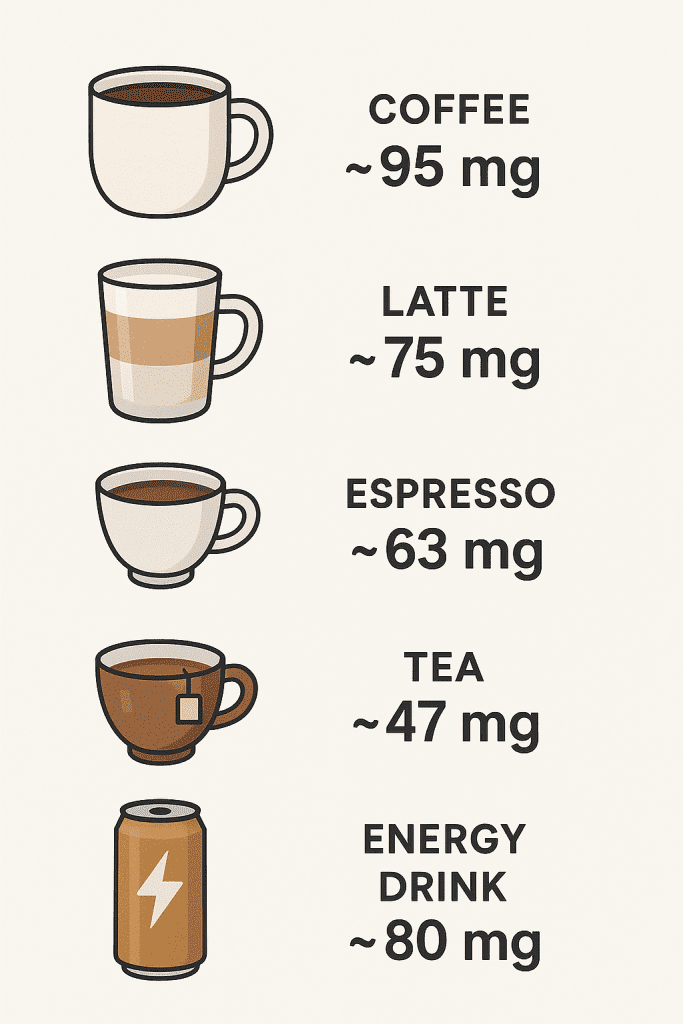
Which Cup Packs the Biggest Punch?
Hidden Sources of Caffeine
Beyond the obvious sources, caffeine lurks in many products you might not suspect:
- Over-the-counter medications (pain relievers, cold medicines)
- Pre-workout supplements
- Weight loss supplements
- Ice creams and desserts (especially those with coffee or chocolate flavours)
- Protein and energy bars, Flavoured waters marketed for “energy”
Always check labels for caffeine content, especially if you’re sensitive to its effects or trying to manage your total daily intake. Some products list caffeine content clearly, while others may only note that caffeine is present without specifying the amount.
Understanding Serving Sizes
Standard serving sizes vary significantly across beverages, making it challenging to compare caffeine content accurately. For example, an 8-ounce cup of brewed coffee contains about 80-100 mg of caffeine, while a “grande” coffee shop serving (16 oz) may contain double that amount. Energy drinks often contain caffeine comparable to that of coffee, but are frequently consumed in larger volumes, leading to higher total intake.
How Long Does Caffeine Affect Sleep and Rest
One of the most common concerns about caffeine is its potential to disrupt sleep, even when consumed earlier in the day. This guide emphasizes the importance of understanding caffeine’s long-lasting effects, which can interfere with both falling asleep and the quality of sleep, making you more aware and cautious about your caffeine consumption.
Caffeine and Sleep Disruption
Research confirms that caffeine consumed even 6 hours before bedtime can significantly reduce total sleep time and sleep quality. The sleep-disrupting effects come from caffeine’s ability to block adenosine, the neurotransmitter that helps regulate sleep-wake cycles.
Specific sleep disruptions from late caffeine consumption include:
- Increased time to fall asleep (longer sleep latency)
- Reduced total sleep time
- Less deep sleep (slow-wave sleep)
- More frequent nighttime awakenings
- Overall lower sleep efficiency (percentage of time in bed sleeping)
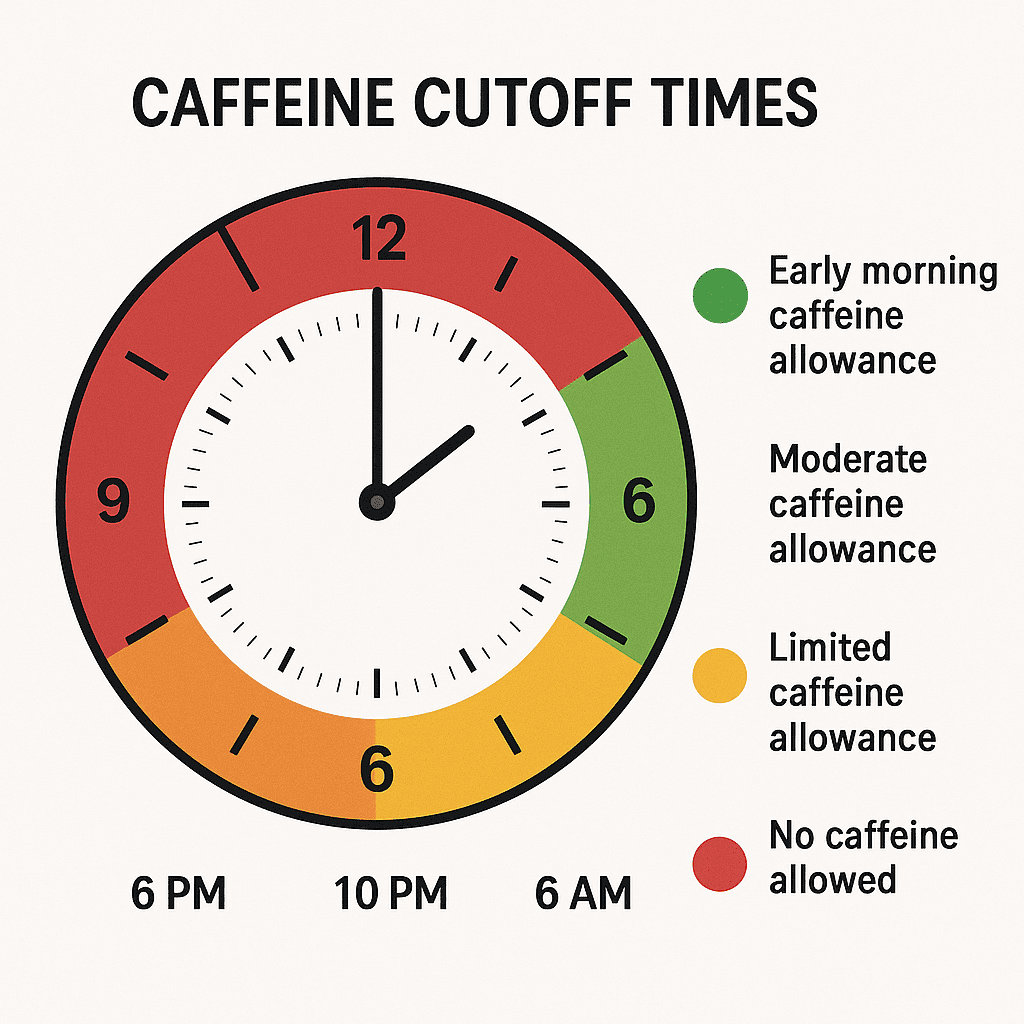
Timing Your Last Cup for Sweet Dreams
Recommended Cutoff Times
Based on caffeine’s half-life and sleep research, experts recommend stopping caffeine consumption at least 6-8 hours before your planned bedtime. However, people who are slow metabolizers or more sensitive to caffeine may need an even earlier cutoff time, potentially 8-10 hours before bed.
For example, if you typically go to bed at 10:00 PM:
- Average metabolizers: Last caffeine before 2:00-4:00 PM
- Slow metabolizers: Last caffeine before 12:00-2:00 PM
- Very sensitive individuals: Last caffeine before 10:00 AM-12:00 PM
Age-Related Sleep Concerns
Older adults should be particularly cautious about late-day caffeine consumption, as their slower metabolism means that caffeine remains in their system for a longer period. What didn’t disrupt sleep in your 20s might cause insomnia in your 60s and beyond.
Additionally, older adults often experience natural changes in sleep architecture that make them more vulnerable to sleep disturbances from stimulants like caffeine. For this population, limiting caffeine to morning hours may be the safest approach for preserving sleep quality.
Safe Caffeine Consumption Guidelines
While caffeine is generally recognised as safe for most people, understanding appropriate limits helps you avoid adverse side effects while still enjoying its benefits.
Daily Caffeine Limits
Health authorities provide clear guidelines for safe caffeine consumption:
- Healthy adults: Up to 400 mg per day (roughly 4 cups of brewed coffee)
- Pregnant and breastfeeding women: No more than 200 mg per day
- Adolescents (12-18): No more than 100 mg per day
- Children under 12: Caffeine is not recommended
These limits represent amounts that are unlikely to cause adverse health effects in the majority of people. However, individual sensitivity varies greatly, and some people may need to consume less to avoid side effects like anxiety, jitters, or sleep disruption.
Signs You’re Consuming Too Much Caffeine
Your body provides clear signals when caffeine intake exceeds your tolerance. Common signs of excessive caffeine consumption include:
- Feeling jittery or shaky
- Increased anxiety or nervousness
- Racing heart or palpitations
- Difficulty sleeping
- Digestive discomfort
- Headaches
- Irritability
- Feeling “wired but tired”
These symptoms suggest you may need to reduce your caffeine intake or adjust when you consume it. Even if you’re within recommended limits, your sensitivity might require lower amounts.
Special Populations and Caffeine Concerns
Certain groups should exercise extra caution with caffeine:
- People with anxiety disorders: Caffeine can worsen anxiety symptoms
- Those with heart conditions: Caffeine may affect heart rate and blood pressure
- People taking certain medications: Caffeine can interact with many drugs
- Those with sleep disorders: Even small amounts of caffeine can exacerbate insomnia
Benefits and Risks of Regular Caffeine Consumption
Caffeine offers numerous potential benefits when consumed moderately, but also carries risks when overused or misused.
Potential Health Benefits
Research suggests moderate caffeine consumption may provide several health advantages:
- Enhanced alertness and concentration
- Improved athletic performance and endurance
- Possible reduced risk of Parkinson’s disease
- Potential protection against Alzheimer’s disease and dementia
- Possible reduced risk of certain types of cancer
- A metabolism boost that may aid weight management
Coffee has been linked explicitly to a reduced risk of type 2 diabetes, liver disease, and certain cancers, although it’s unclear whether caffeine or other compounds in coffee are responsible.
Potential Health Risks
Despite its benefits, caffeine can present health risks for some individuals:
- Increased anxiety, especially in those with anxiety disorders
- Disrupted sleep patterns leading to chronic fatigue
- Temporary increases in blood pressure
- Potential bone density concerns with very high consumption
- Digestive issues, including acid reflux and stomach discomfort
- Headaches from withdrawal when consumption is reduced
The risk-benefit profile varies significantly among individuals based on their genetics, existing health conditions, and lifestyle factors. What works well for one person may cause problems for another.
Long-Term Caffeine Use
Regular caffeine consumers develop tolerance, requiring more caffeine over time to achieve the same level of alertness. This can lead to dependency, where stopping caffeine results in withdrawal symptoms such as headaches, fatigue, and irritability.
However, unlike addictive drugs, caffeine dependency doesn’t typically lead to dangerous drug-seeking behaviours or serious health consequences. Most people can manage their caffeine intake without significant problems.
Managing Your Caffeine Intake Effectively
Whether you want to maximise caffeine’s benefits, minimise its side effects, or reduce your dependence, strategic management of your caffeine intake can help.
Optimal Timing for Caffeine Consumption
The timing of your caffeine intake significantly affects its impact:
- Morning (after waking up): Wait 90-120 minutes after waking for optimal benefit, as this allows your natural cortisol levels to peak first
- Pre-workout: 30-60 minutes before exercise for enhanced performance
- Afternoon: Limit caffeine after 2 PM to avoid sleep disruption
- Before long drives or tasks requiring sustained attention: 30 minutes before for maximum alertness
Strategic timing helps you reap caffeine’s benefits while minimising its adverse effects, such as sleep disruption or afternoon crashes.
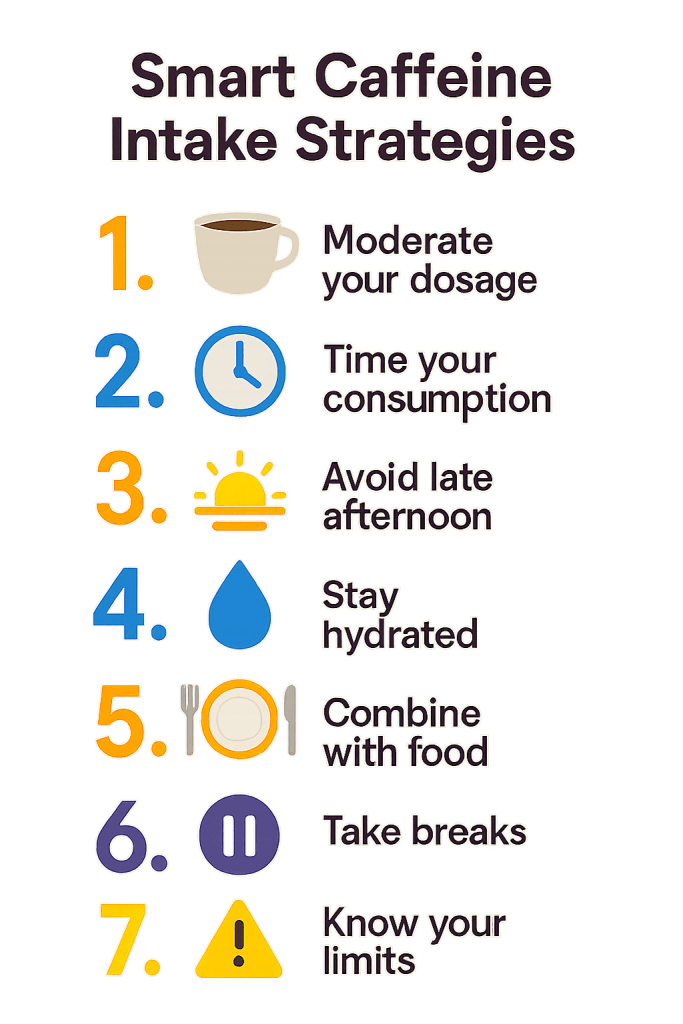
Smart Strategies for Steady Energy
Tips for Reducing Caffeine Sensitivity
If you experience unpleasant side effects from caffeine, try these strategies:
- Stay well-hydrated by drinking plenty of water alongside caffeinated beverages
- Consume caffeine with food to slow its absorption
- Choose lower-caffeine alternatives like green tea instead of coffee
- Consider caffeine-sensitive formulations that release more slowly
- Build in caffeine-free days to reset your sensitivity
Small changes in how you consume caffeine can significantly reduce adverse side effects while preserving benefits.
Cutting Back on Caffeine
If you need to reduce your caffeine intake, gradual tapering helps minimise withdrawal symptoms:
- Decrease intake by 25% each week until reaching your target level
- Mix regular coffee with increasing amounts of decaf
- Replace some caffeinated drinks with alternatives like herbal tea
- Be patient with withdrawal symptoms, which typically peak within 24-48 hours and resolve within a week
- Get adequate sleep, stay hydrated, and exercise to help manage withdrawal
Sudden elimination of caffeine often leads to headaches, irritability, and fatigue—symptoms that can be avoided mainly through gradual reduction.
Natural Alternatives to Caffeine for Energy
If you’re looking to reduce caffeine while maintaining energy levels, several natural alternatives can help.
Food-Based Energy Boosters
Certain foods and nutrients support sustained energy without caffeine:
- Complex carbohydrates with protein for stable blood sugar
- B vitamins are found in whole grains, nuts, and leafy greens
- Iron-rich foods like legumes, lean meats, and dark leafy vegetables
- Magnesium from nuts, seeds, and whole grains
- Hydration—even mild dehydration can cause fatigue
Regular meals and snacks that combine protein, healthy fats, and complex carbohydrates help maintain consistent energy levels throughout the day.
Herbal and Natural Alternatives
Several herbal preparations offer energy-supporting properties without caffeine:
- Chicory root coffee substitutes
- Herbal teas like peppermint, ginger, or rooibos
- Maca root powder added to smoothies or oatmeal
- Rhodiola rosea supplements for mental fatigue
- B vitamin complex supplements
These alternatives work through different mechanisms than caffeine—some support adrenal function, others improve circulation, and some provide nutrients that help cellular energy production.
Lifestyle Adjustments for Natural Energy
Often, the most effective energy-boosting strategies involve lifestyle changes:
- Regular physical activity improves circulation and energy
- Consistent sleep schedule with 7-9 quality hours nightly
- Stress management techniques like meditation or deep breathing
- Exposure to natural daylight, especially in the morning hours
- Short power naps (10-20 minutes) when needed
The Bottom Line on Caffeine Duration
Caffeine typically remains active in your body for 4-6 hours, with a half-life averaging 5-6 hours in healthy adults. However, its complete elimination can take 10-12 hours or longer, depending on individual factors like age, genetics, medications, and overall health.
Understanding your response to caffeine helps you make informed choices about when and how much to consume. Pay attention to how caffeine affects your energy, mood, and sleep quality at different times of day and adjust accordingly.
For most people, enjoying caffeine in moderation (under 400 mg daily) and timing consumption appropriately (avoiding it within 6-8 hours of bedtime) allows you to benefit from its energy-boosting and cognitive-enhancing properties without unwanted side effects.
If you experience adverse effects like anxiety, jitters, or sleep problems, consider reducing your intake, adjusting your timing, or exploring lower-caffeine alternatives. Remember that caffeine sensitivity often increases with age, so what worked for you previously might need adjusting as you get older.
By understanding the science behind how long caffeine lasts and the factors that affect its duration in your system, you can make more informed decisions about your caffeine consumption for optimal energy, productivity, and health.


